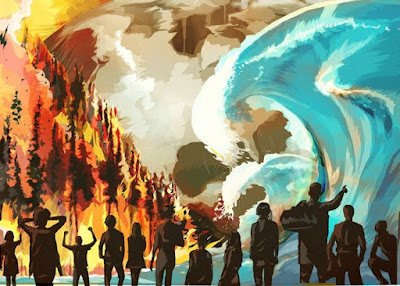by John Azrak

On this day in literary history
Bob Dylan did not show to pick up
his Nobel prize in literature
Maybe the laureate’s in the kitchen
with the Tombstone Blues
High Water everywhere
or he’s found TS Eliot and Ezra Pound
at Odds and Ends on Desolation Row;
maybe meeting his pal Sam Shepard
in East Texas to sing Brownsville Girl
or dancing with Shakespeare in the alley
in his pointed shoes and bells
Stuck Inside of Mobile
with the Memphis Blues Again
waiting to find out what price
he has to pay to get out of going
through all these things twice:
the degree from Princeton University
honorary but the Song of the Locusts
off stage left him pining to be free
Or he’s busy looking for his Lo and Behold
no longer wed to Isis, the mythical child,
who breaks Just Like a Woman
among the missing Absolutely Sweet Marie,
the Sad-Eyed Lady of the Lowlands,
Sally, Sara, Little Sadie, Saro, Ramona too
in a Series of Dreams, Saint Augustine;
if nothing else, these Visions of Johanna
have kept him up past the dawn
dog-tired A Million Miles from the ever
(
it’s now or never more than ever)
he's forever chasing, Just Like Tom Thumb
too wasted for the Million Dollar Bash
drinking One More Cup of Coffee
for Too Much of Nothing:
he's got a million people at his feet
singing Under the Red Sky
What Good Am I?
and all he sees are Dark Eyes
Maybe he’s visiting with Baby Blue
who’s changed his last name too
where he’ll strike a match and start anew
with Queen Jane whose mother
has sent back all of her invitations
until Nothing Was Delivered;
or off to see Judas Priest and Frankie Lee
who won’t go mistaking Paradise
for that home across the road;
he could be Watching the River Flow
Spirit on the Water, Heart in the Highlands
listening to Johnny Cash, reading James Joyce;
or he Went to See the Gypsy
searching for a New Blue Moon
the sun rising in that little Minnesota town
where the Foot of Pride leaves no prints
Love Minus Zero has no limit
and My Back Pages reveals:
I was so much older then
I’m younger than that now
Forever Young at seventy-five
Dylan Ain’t Talkin’ just walkin’
through this weary world of woe
passing on his Nobel speech this day
but put some bleachers out in the sun
and maybe he'll deliver it on Highway 61
where a thousand telephones don’t ring
and Dignity can’t be photographed;
Ring Them Bells but not for him unless
they’re Chimes of Freedom flashing
for Stockholm, Sweden holds no key
to truths outside the Gates of Eden,
and if the committee has been left
Standing in the Doorway, crying
with blues wrapped around its head,
Don’t Think Twice, It’s All Right
(Sooner or Later) One of Us Must Know
that he really did try to get close to you:
hey, If Dogs Run Free, why not he
or we all One Too Many Mornings
and a thousand miles behind
Tryin’ to Get to Heaven
before they close the door.
John Azrak, a native New Yorker, has published widely in literary journals. He thought Dylan's excuse, "pre-existing commitments," for not attending the awards ceremony was pretty funny and more like "conditions," uninsurable and the inspiration for this poem. Azrak highly recommends Todd Haynes's aptly titled Dylan movie
I'm Not There.






